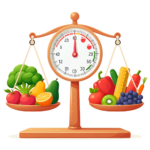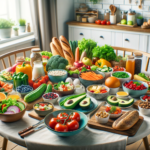The Importance of Meal Prepping
As a young nutritionist, I’m excited to share the wonders of meal prepping. It’s more than food organization; it’s a lifestyle change boosting health and daily efficiency. Meal prepping ensures consistent, balanced meals, crucial for those new to healthy eating. It combats the temptation of quick, unhealthy choices, especially when life gets hectic.
With meal prepping, you save time and reduce daily stress. It’s budget-friendly, cutting down on impromptu takeouts. You control your nutritional intake, balancing proteins, carbs, and fats, thus curbing unhealthy cravings. Plus, it’s adaptable to any lifestyle, whether you’re a busy parent or a career-focused individual.
Embracing meal prepping means making intentional choices for well-being. It’s a fun, creative journey, keeping your diet diverse and enjoyable. In essence, meal prepping is a key strategy for a health-conscious life, offering numerous benefits from nutrition to convenience. Let’s start this journey and master meal prepping strategies for a healthier, balanced life.
Strategies for Effective Meal Planning

Diving into meal prepping strategies, let’s focus on effective meal planning. It’s the foundation for successful meal prepping, and I’m here to guide you through it. Firstly, think of your dietary goals and preferences. Are you aiming for weight loss, muscle gain, or just healthier eating? This will shape your meal plan.
Start by mapping out your week. For instance, consider busy days when a quick meal might be best. On the other hand, you might have more time on weekends for elaborate dishes. Variety is key; mix different proteins, veggies, and grains to keep things interesting. This not only ensures nutritional balance but also keeps your taste buds happy.
Furthermore, don’t forget to factor in snacks. Healthy snacking is crucial to avoid mid-day slumps. Include fruits, nuts, or yogurt to keep your energy up. Meanwhile, make sure to check your pantry and fridge. This helps avoid buying duplicates and encourages using what you already have.
In conclusion, effective meal planning is a balance of nutrition, variety, and practicality. It’s a core aspect of meal prepping strategies that sets you up for a week of healthy, stress-free eating. Remember, a little planning goes a long way in maintaining a balanced diet.
Grocery Shopping Made Easy

Navigating the grocery store doesn’t have to be overwhelming, and with the right meal prepping strategies, it can be quite efficient. First and foremost, a well-thought-out shopping list is your best ally. This should align with your meal plan, ensuring you buy exactly what you need, no more, no less. This approach not only saves time but also minimizes food waste.
When shopping, start with fresh produce. Look for vibrant fruits and vegetables, as these are often more nutrient-dense. However, don’t shy away from frozen options; they’re great for longevity and can be just as nutritious. For proteins, mix it up with lean meats, fish, and plant-based alternatives like beans and tofu. This variety supports a balanced diet and keeps meals exciting.
Moreover, consider whole grains and healthy fats like avocados and nuts. These are essential for a well-rounded meal. Meanwhile, be mindful of labels on processed foods; opt for items with fewer additives and lower sugar content. This is crucial for maintaining a healthy lifestyle.
In short, effective grocery shopping is a pivotal part of meal prepping strategies. It’s about making smart, informed choices that align with your health goals. With a clear plan and a little savvy shopping, you’ll be set for a week of nutritious, delicious meals.
Smart Food Storage Solutions

Mastering food storage is a vital part of meal prepping strategies, ensuring your carefully planned meals stay fresh and tasty. Firstly, it’s essential to understand which foods go where. For instance, some fruits emit gases that can hasten spoilage in vegetables, so separate them. Refrigerate leafy greens, but keep tomatoes and bananas at room temperature. This simple knowledge can significantly extend your food’s lifespan.
When storing cooked meals, airtight containers are your best friends. They keep food fresh and prevent odors from mingling in your fridge. However, remember not to store hot food directly in the refrigerator; let it cool first. This prevents bacterial growth and maintains the quality of your meals.
Moreover, labeling your containers with dates helps keep track of what to eat first, reducing waste. For freezing, use freezer-safe bags or containers. This is especially useful for batch cooking. Freeze in portion sizes for easy thawing and reheating. Meanwhile, regularly organizing your fridge and pantry ensures everything is visible and accessible, reducing the chances of forgotten leftovers.
In conclusion, smart food storage plays a crucial role in meal prepping strategies. It’s about keeping your meals as fresh and nutritious as the day you made them. With these tips, you’ll find maintaining the quality of your prepped meals both easy and efficient.
Preparing Versatile and Nutritious Meals

Creating versatile and nutritious meals is a cornerstone of successful meal prepping strategies. It’s crucial to strike a balance between variety and nutrition. For instance, rotating protein sources like chicken, fish, and legumes keeps meals interesting and nutritionally diverse. Similarly, experimenting with different vegetables and whole grains can introduce a range of flavors and nutrients.
Moreover, cooking methods matter. Grilling, baking, and steaming are healthier options compared to frying. These methods preserve the natural flavors and nutrients of foods. However, don’t be afraid to use herbs and spices. They not only add zest to your dishes but also pack health benefits. For example, turmeric has anti-inflammatory properties, while cinnamon can help regulate blood sugar levels.
Meanwhile, batch cooking is a time-saver. Preparing large quantities of versatile base ingredients, like quinoa or roasted vegetables, allows for multiple meal options throughout the week. This approach reduces cooking time while ensuring you have healthy meals at hand.
Meal Prepping Strategies for Busy Schedules

For those with busy schedules, meal prepping strategies can be a lifesaver. Firstly, it’s all about efficiency. Allocating a specific time, like Sunday afternoon, for meal prep can streamline your week. During this time, focus on preparing base ingredients in bulk. For example, cook a large batch of brown rice or roast a tray of mixed vegetables. These can then be quickly turned into various meals throughout the week.
Furthermore, embrace the power of multitasking in the kitchen. While your grains cook, you can chop vegetables or prepare protein sources. This method maximizes your time, making meal prep less daunting. However, it’s also important to keep meals simple. Quick, easy recipes are often just as nutritious and far less time-consuming.
Another key strategy is utilizing kitchen appliances. Slow cookers and pressure cookers are fantastic for making large quantities of food with minimal effort. They can cook your meal while you’re at work or running errands. Meanwhile, freezing meals is also a great option. Preparing and freezing portions ensures you have healthy meals ready on particularly hectic days.
Maintaining a Healthy Diet with Meal Prepping

Maintaining a healthy diet is a journey, and meal prepping plays a crucial role in this process. Firstly, consistency is key. Regular meal prepping helps establish healthy eating habits, as you’re less likely to opt for fast food when you have a nutritious meal ready. However, it’s important to remember that flexibility is essential. Life can be unpredictable, so it’s okay if occasionally things don’t go as planned. The goal is to make healthy eating a habit, not a chore.
Moreover, listening to your body is vital. Sometimes, you might crave something different than what you’ve prepped. It’s perfectly fine to adjust your meals accordingly. This adaptability ensures that meal prepping supports, rather than restricts, your dietary needs and preferences.
Another aspect is portion control, which meal prepping inherently supports. By preparing meals in advance, you can ensure appropriate portion sizes, aiding in managing calorie intake. However, it’s not just about the quantity of food; quality matters too. Incorporating a variety of nutrients in your meals is crucial for overall health.
In conclusion, maintaining a healthy diet with meal prepping is about finding the right balance between routine and flexibility. It’s about making conscious food choices and listening to your body’s needs. With these strategies, meal prepping becomes an enjoyable and sustainable part of a healthy lifestyle.





Leave a Reply